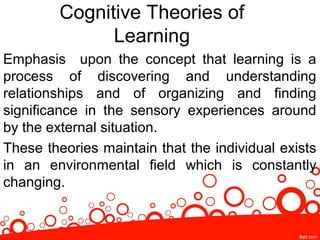Cognitive theories of learning
•Als PPT, PDF herunterladen•
17 gefällt mir•6,366 views
Module 2
Melden
Teilen
Melden
Teilen

Empfohlen
Empfohlen
Weitere ähnliche Inhalte
Was ist angesagt?
Was ist angesagt? (20)
Andere mochten auch
Andere mochten auch (20)
Moral Symmetry & Four Domains Of Moral Education Pres

Moral Symmetry & Four Domains Of Moral Education Pres
2nd Lecture (HUMAN DEVELOPMENT - Meaning, Concepts and Approaches)

2nd Lecture (HUMAN DEVELOPMENT - Meaning, Concepts and Approaches)
Learning theories and their implications on educational technology

Learning theories and their implications on educational technology
Ähnlich wie Cognitive theories of learning
Ähnlich wie Cognitive theories of learning (20)
Understanding Learning and Acquisition of Knowledge

Understanding Learning and Acquisition of Knowledge
Kürzlich hochgeladen
Mehran University Newsletter is a Quarterly Publication from Public Relations OfficeMehran University Newsletter Vol-X, Issue-I, 2024

Mehran University Newsletter Vol-X, Issue-I, 2024Mehran University of Engineering & Technology, Jamshoro
Making communications land - Are they received and understood as intended? webinar
Thursday 2 May 2024
A joint webinar created by the APM Enabling Change and APM People Interest Networks, this is the third of our three part series on Making Communications Land.
presented by
Ian Cribbes, Director, IMC&T Ltd
@cribbesheet
The link to the write up page and resources of this webinar:
https://www.apm.org.uk/news/making-communications-land-are-they-received-and-understood-as-intended-webinar/
Content description:
How do we ensure that what we have communicated was received and understood as we intended and how do we course correct if it has not.Making communications land - Are they received and understood as intended? we...

Making communications land - Are they received and understood as intended? we...Association for Project Management
Kürzlich hochgeladen (20)
Unit-IV; Professional Sales Representative (PSR).pptx

Unit-IV; Professional Sales Representative (PSR).pptx
Mixin Classes in Odoo 17 How to Extend Models Using Mixin Classes

Mixin Classes in Odoo 17 How to Extend Models Using Mixin Classes
Making communications land - Are they received and understood as intended? we...

Making communications land - Are they received and understood as intended? we...
Basic Civil Engineering first year Notes- Chapter 4 Building.pptx

Basic Civil Engineering first year Notes- Chapter 4 Building.pptx
Python Notes for mca i year students osmania university.docx

Python Notes for mca i year students osmania university.docx
This PowerPoint helps students to consider the concept of infinity.

This PowerPoint helps students to consider the concept of infinity.
ICT Role in 21st Century Education & its Challenges.pptx

ICT Role in 21st Century Education & its Challenges.pptx
Cognitive theories of learning
- 1. Cognitive Theories of Learning Emphasis upon the concept that learning is a process of discovering and understanding relationships and of organizing and finding significance in the sensory experiences around by the external situation. These theories maintain that the individual exists in an environmental field which is constantly changing.
- 2. 2 theories Social cognitive theory Cognitive behavioral theory
- 3. Cognitive theorist Interpret learning as the organization or reorganization of the subject’s perceptual system into meaningful patterns. There are a number of cognitive theorists and many more are still emerging.The forerunners,howerver are Wolfgang kohler, Kurth Lewin and Jerome Bruner whose theories are all presented in this section
- 5. Gaining insight Is a process of exploring, analyzing and restructuring perceptions until a solution is arrived at.
- 10. 1. Law of Continuity This law states the perceptual organization to preserve smooth continuities rather than abrupt changes.
- 12. 2. Law of Closure This law states that incomplete figures tend to be seen as complete. For instance, the following figures will be perceived better as complete circles and squares.
- 13. 3. Law of proximity This law holds that things close together are grouped together in perception.
- 14. 4. Law of similarity This law refers to the perception of similar objects that tend to be related.
- 15. 5. Law of Pragnanz This Law came about as an overarching principle of Gestalt psychology. Developed by koffka(1993), it states that of all the possible organizations that could be perceived from a visual stimulus.
- 19. - Focused on the psychological field or life space of an individual. Jerome Bruner came up with his learning theory focused on the problem of what people do with information to achieve generalized insights or understanding.
- 22. To him “ learning at its best is thinking, thinking is the process whereby one makes sense of a hodgepodge of perceived facts through a process called either conceptualization or categorization.
- 27. Information – Processing Theory • Information Processing Theory is a learning theory • Describes psychological events in terms of transformations of information from input to output. These theories stress the value of perception, attention, and memory in the learning process.
- 29. Learning Theories and their Application to classroom and School Practices Learning Theories and their Application to classroom and School Practices • conditioning and reinforcement as the bases for these theories. • Influenced the use if reinforcements techniques in the control of various kinds of disruptive behavior in the classroom which is reffered to as behavior modification.
- 30. • Program learning is a system of learning in which pre established subject matter is broken down into sequential steps. TRANSFER OF LEARNING When learning is in one situation or one form of activity affects one’s ability in other types of activity or one’s performance in different situations.
- 34. Theories of transfer of learningTheories of transfer of learning How transfer takes place has been the subject of a number of studies which have led to the formulation of several theories:
- 43. The major problem of the classroom teacher is knowing and applying the art of motivation. No lesson plan is considered complete unless it include motivation.